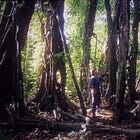Welcome to the latest edition of Global Nature Beat. If you are new here, read my About page to find out what this newsletter is, who I am and why I am doing this. Or just dive in. You’ll find news, reporting resources, job postings, links to some great stories and a look ahead to what’s coming up in the world of biodiversity and nature policy.
In this edition you will find: Environmental heroes. Birds back from the brink. Deep-sea mining. Wildlife trade. Mangrove restoration. Journalism tips. Jobs and opportunities. New research papers, and much more.
Deep-sea mining: On 24 April, President Trump signed an executive order to expedite a process that would allow US-linked companies to mine the seabed in international waters. This is despite the United States not being a member of the international body that is developing rules to govern deep-sea mining, the International Seabed Authority (ISA). The ISA’s secretary-general Leticia Carvalho told Mongabay that any commercial exploitation of the international seabed without ISA’s authorization would violate international law. Dialogue Earth spoke with environmental lawyer Duncan Currie about what the developments mean.
Environmental heroes: Seven environmental activists from around the world have won this year’s Goldman Environmental Prize for their years of work protecting ecosystems and tackling pollution. The winners come from Albania, the Canary Islands, Mongolia, Peru, Tunisia and the United States. Fred Pearce interviewed one of the winners, Batmunkh Luvsandash, who has protected more than half a million hectares of Mongolian grasslands from mining. Read profiles of the other winners here.
Indigenous issues: The 2025 meeting of the UN Permanent Forum on Indigenous Issues is underway at the UN headquarters in New York City, from 21 April to 3 May. The forum was created in 2002 to enable Indigenous Peoples to engage meaningfully with the United Nations system, whose focus on member states had left them out. Matters raised at the meeting will be included in a report and shared with UN agencies and national governments. Key among these will be concerns over climate change, forests and mining in indigenous lands for metals and minerals needed for the energy transition away from fossil fuels.
Wildlife trade: The Secretariat of the Convention on International Trade in Endangered Species (CITES) shared details of the upcoming 20th Conference of Parties. The meeting — in November in Uzbekistan — is set to be tense. Parties to CITES have become polarized over the question of legalizing trade in elephant ivory and rhino horns, with those in southern Africa considering withdrawing from the treaty. This week, researchers published a paper suggesting structural reforms to maintain the integrity of CITES, taking lessons from Japan’s withdrawal from the International Whaling Commission.
High seas biodiversity: The European Commission published its proposal to integrate the Agreement on Marine Biodiversity of Areas Beyond National Jurisdiction into European Union law, ahead of its entry into force. The proposed directive would help EU member states to implement the agreement. It focuses on three areas: establishment of large marine protected areas; environmental impact assessments in international waters; and sharing of benefits from marine genetic resources. See the press release.
In The Spotlight
Paige Cromley wrote about the how the Bali starling — once down to a wild population of around ten birds — is now thriving thanks to community-based conservation and a counterintuitive decision to legalize trade of the species.
Astrid Arellano told the story of the women from a Mexican fishing community who have spent 15 years restoring local mangrove forests.
Gustavo Faleiros reflected on the recent deaths of Pope Francis and Peruvian writer Mario Vargas Llosa — two men with divergent political views who both denounced abuses against indigenous peoples and the Amazon in their own way.
Tips And Resources
Carbon Brief published a glossary and guide to 25 ‘climate-friendly’ farming methods.
On 2 May, environmental economist Edward Barbier is giving an online seminar on the economics of nature-based solutions for mitigating climate change — register here.
The Society of Environmental Journalists has a new tipsheet on covering wildfire.
The World Resources Institute published an explainer on deep-sea mining.
See past editions for more tips and resources.
What Caught My Eye
The Frontiers Planet Prize identified 19 science-based solutions with great potential to tackle the planetary crisis.
Revive Our Ocean is a new initiative supporting local communities to create new marine protected areas, initially focusing on Greece, Indonesia, Mexico, the Philippines, Portugal, Turkey and the United Kingdom — see the press release.
Seven nongovernmental organizations urged the UK government to adopt regulations to address the country’s role in deforestation.
Peter Schwartzstein wrote about how climate change is undermining efforts by journalists to report what is happening.
“Biologically impossible” birth rates at monkey-breeding facilities in Cambodia and Vietnam suggest extensive illegal trade in wild-caught animals, reports Gerald Flynn.
Birdlife International is alarmed by the prospect of a mass cull of cormorants in Europe, proposed by a committee of the UN Food and Agriculture Organization to protect fish stocks.
The Trump administration’s abrupt withdrawal of overseas aid has forced the termination of conservation projects around the world, reports Adam Welz…
…but as Leona M. Bhuyan writes, the demolition of USAID has also exposed the conservation sector’s dependence on external donors and created an opportunity to reimagine conservation finance.
Following recent arrests of suspected ant-traffickers in Kenya, the Wildlife Detective explored whether growing trade in insects will become a conservation concern.
André Duchiade wrote about how the US-China tariff war could increase deforestation in Brazil.
Carlos Alvarado Quesada — former President of Costa Rica — wrote in support of the proposed Tropical Forests Forever Facility.
Seven key deforestation battles playing out across India.
From The Journals
Climate change is now the top threat to endangered species in the United States — read the press release or the full paper.
Ticks are more likely to carry bacteria that cause Lyme disease in areas where non-native pheasants are released for shooting — read the press release or the full paper.
Paying fishers not to catch endangered species can backfire — read the press release, the full paper or a commentary by one of the authors.
The first countrywide assessment of the conservation effectiveness of Italy’s national parks found big gaps —read the full paper.
Use of ‘nature positive’ terminology by ‘Big Tourism’ is political and creates new risks to conservation — read the press release or the full paper.
The International Union for the Conservation of Nature’s Red List does not reflect what Indigenous peoples and local communities perceive about how climate change threatens species — read the full paper.
If You Find This Useful…
… please consider supporting my work. If you can spare £1 a week for a paid subscription, you will be helping me to keep Global Nature Beat going for those who cannot afford to pay.
Jobs And Opportunities
Positive News is hiring an editor — no deadline listed.
Lighthouse Reports is hiring a visual impact producer —deadline 12 May.
The Pulitzer Center is hiring a director of editorial programs — deadline 18 May.
Dialogue Earth is hiring a Southeast Asia editor — deadline 21 May.
Journalismfund.eu is offering grants for investigative environmental journalism — deadline 24 July.
Bonus content: There are 27 jobs, grants, fellowships and other opportunities listed here for Global Nature Beat’s paying supporters. Paid subscriptions are less than £1 per week.
In Case You Missed It
On The Horizon
28 April – 9 May: The 2025 Meetings of the Conference of the Parties to the Basel, Rotterdam and Stockholm Conventions take place in Geneva, Switzerland.
5–7 May: The IUCN World Commission on Environmental Law (WCEL) will host the 4th IUCN WCEL World Environmental Law Congress in Rabat, Morocco.
27-29 May 2025: The conference of the Public Communication of Science and Technology Network takes place in Aberdeen, Scotland.
27-29 May 2025: The 5th Global Conference of the Sustainable Food Systems (SFS) Programme will take place in Brasilia, Brazil.
Bonus content: The full calendar for Global Nature Beat’s supporters includes nature-related intergovernmental negotiations, scientific conferences, report launches, and other events up until 2026.
Whose Eye Was It?
The eye belongs to a white-cheeked turaco. Photo credit: Nik Borrow / Flickr — Creative Commons
Thanks for reading. For past editions, see the Archive. If you found it interesting or useful, please share and subscribe. If you want to get in contact, you can reach me at: thenaturebeat@substack.com.






